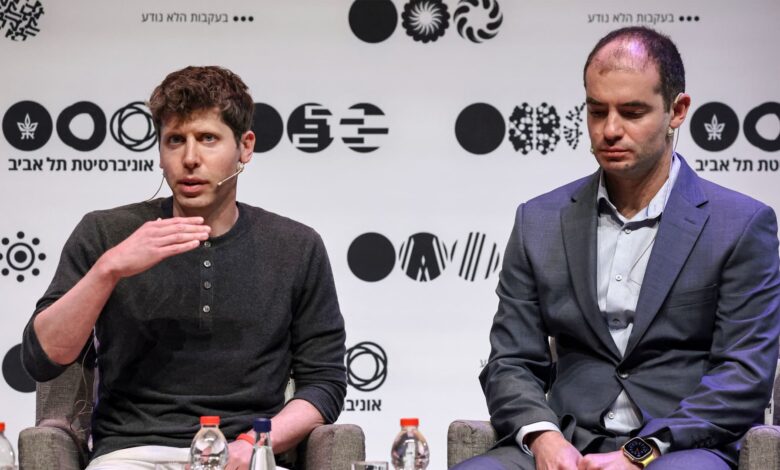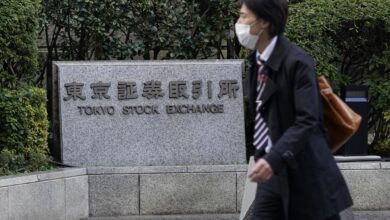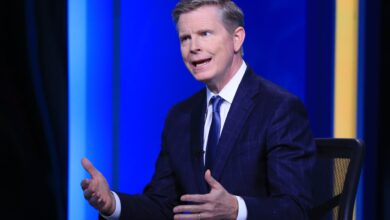Sam Altman’s back. Here’s who’s on the new OpenAI board and who’s out

Sam Altman (L), US entrepreneur, investor, programmer, and founder and CEO of artificial intelligence company OpenAI, and the company’s co-founder and chief scientist Ilya Sutskever, speak together at Tel Aviv University in Tel Aviv on June 5, 2023.
Jack Guez | Afp | Getty Images
After a weekend of crisis and tumult, Sam Altman has returned as the CEO of OpenAI. Three new board members have replaced the previous leadership that ousted Altman.
OpenAI’s new board doesn’t appear to be fully built. Negotiations are reportedly underway to install representation from Microsoft, which has invested billions of dollars in OpenAI, or other major investors.
There’s a notable change in the board’s experience. The previous board included academics and researchers, but OpenAI’s new directors have extensive backgrounds in business and technology.
Microsoft CEO Satya Nadella said in an interview with CNBC earlier this week that governance at OpenAI needed to change. Nadella said Wednesday he is “encouraged” by the changes to the company’s board, according to a post on X, formerly known as Twitter.
“We believe this is a first essential step on a path to more stable, well-informed, and effective governance,” he said.
Microsoft, Sequoia Capital, Thrive Capital, and Tiger Global are among the OpenAI investors that lack representation on the board but had been pushing to reinstate Altman, as CNBC previously reported.
Here’s who’s in, who’s out, and what the changes may mean.
Here are the newest members of OpenAI’s board
Bret Taylor, co-CEO of Salesforce, speaks at the Viva Technology Conference in Paris on June 15, 2022.
Nathan Laine | Bloomberg | Getty Images
Bret Taylor, board chair
Bret Taylor is currently a board member at the e-commerce platform Shopify. He’s also the former co-CEO of Salesforce and was Twitter’s final board chair prior to Elon Musk’s acquisition of the social media platform.
Taylor co-founded Quip, a collaboration platform that was acquired by Salesforce in 2016. That acquisition propelled him into the seniormost ranks of the enterprise software company, where he would eventually take the co-CEO title in 2021. Taylor left Salesforce in January.
The executive launched his own artificial intelligence venture alongside a former Google executive in February. It isn’t clear if Taylor’s involvement with his own AI startup will cease with his appointment to lead OpenAI’s board.
Taylor did not immediately respond to CNBC’s request for comment.
Larry Summers at the World Economic Forum in Davos, Switzerland.
David A. Grogan | CNBC
Larry Summers
Larry Summers served as Treasury secretary during the Clinton administration and was the president of Harvard University. An economist by training, Summers also led the Obama administration’s National Economic Council during the Global Financial Crisis.
His connections in Washington could be valuable for OpenAI as the company faces continued regulatory scrutiny from lawmakers.
Late last year, Summers called OpenAI’s popular generative chatbot ChatGPT a “profound thing for humanity” during an interview with Bloomberg. He compared the advent of the technology to the introduction of the printing press and electricity.
“This could be the most important general-purpose technology since the wheel or fire,” Summers said.
Summers also serves on the board of Block, a financial technology company led by Twitter co-founder Jack Dorsey, and on the board of Skillsoft, an educational technology company.
Summers stepped down in 2006 from Harvard’s presidency following backlash on campus about comments he made on gender representation in STEM fields at a diversity conference. Summers later apologized for the remarks, saying in a 2005 letter that he was “wrong to have spoken in a way that has resulted in an unintended signal of discouragement to talented girls and women.”
A representative for Summers declined to comment.
Adam D’Angelo
Adam D’Angelo is the only member of OpenAI’s previous board who still holds a seat. He joined in 2018 and reportedly played a major role in the negotiations that brought Altman back to the helm.
D’Angelo is the CEO of Quora, a platform where users can publicly ask and answer questions. He is also developing an AI chat platform called Poe, which he announced in February. He spent several years at Meta, formerly known as Facebook, and served as CTO from 2006 to 2008.
He has not commented publicly since Altman’s ouster Friday, but he retweeted a post on X that suggested his motives were not “crazy” or “vindictive.” OpenAI’s board fired Altman Friday after determining he was “not consistently candid in his communications,” but its members never elaborated further.
D’Angelo did not immediately respond to CNBC’s request for comment.
Here is who is no longer on OpenAI’s board
Helen Toner, Director of Strategy and Foundational Research Grants at Georgetown’s CSET speaks onstage during Vox Media’s 2023 Code Conference at The Ritz-Carlton, Laguna Niguel on September 27, 2023 in Dana Point, California.
Jerod Harris | Getty Images
Helen Toner
Helen Toner is a researcher and director of strategy and foundational research grants at Georgetown University’s Center for Security and Emerging Technology. Toner was a former employee at Open Philanthropy, serving as an advisor on AI policy.
Toner offered what could be seen as public criticism of OpenAI in an October paper, a decision with which Altman reportedly took issue. The paper suggested that OpenAI’s launch of ChatGPT undermined the company’s efforts to develop AI safely, by spurring other tech companies into launching their own competing chatbots and forcing them to “accelerate or circumvent internal safety and ethics review processes.”
She was one of the directors involved in pushing Altman out. She has not responded to CNBC’s previous attempts to contact her.
Director of Business Development for Geosim Tasha McCauley attends the 2014 Kairos Global Summit at Ritz-Carlton Laguna Nigel on October 17, 2014 in Dana Point, California.
Jerod Harris | Getty Images
Tasha McCauley
Tasha McCauley joined OpenAI’s board in 2018. She is an adjunct senior management scientist at Rand Corporation, and formerly served as the CEO of GeoSim Systems, which developed an automated city modeling system.
She is married to actor and filmmaker Joseph Gordon-Levitt, who announced the union in 2015.
McCauley has not commented publicly since Altman’s firing Friday. She did not respond to CNBC’s requests for comment.
Ilya Sutskever, Russian Israeli-Canadian computer scientist and co-founder and Chief Scientist of OpenAI, speaks at Tel Aviv University in Tel Aviv on June 5, 2023.
Jack Guez | AFP | Getty Images
Ilya Sutskever
Ilya Sutskever co-founded OpenAI and serves as its chief scientist. He also aligned himself, for a time, with the board members who ousted Altman.
Sutskever is the author or co-author of more than 130 research papers on artificial intelligence, neural networks, and generative AI, according to his Google Scholar profile. He holds a PhD in computer science from the University of Toronto and had a brief post-doctoral stint at Stanford, according to his LinkedIn profile.
Sutskever co-led OpenAI alongside president Greg Brockman, an idea that Altman at the time described as “non-traditional.” Sutskever is close with Brockman and officiated his wedding at OpenAI headquarters in 2019.
A personal plea from Brockman’s wife reportedly helped bring Sutskever back into Altman’s camp. Sutskever was one of the first signatories on a letter signed by the vast majority of OpenAI employees that demanded the board’s resignation over the weekend. He repudiated his support for the board in a post on X.
Despite his about-face, Sutskever was removed from the board. His status as an OpenAI executive does not appear to have changed.
What’s next?
Sam Altman, chief executive officer (CEO) of OpenAI and inventor of the AI software ChatGPT, joins the Technical University of Munich (TUM) for a panel discussion.
Sven Hoppe | Picture Alliance | Getty Images
Semafor reported that Altman had been pushing for months to add more directors at OpenAI, and reports suggest it’s unlikely that OpenAI’s board will remain this small.
Bloomberg said on Thursday that, among the changes Microsoft wanted, was a larger and more experienced board. It’s currently smaller, and we don’t know what, if any, kind of other protections or role on the board Microsoft might get.
The composition of the new board — experienced technology and business executives — suggests that OpenAI may be transforming into a more conventional Silicon Valley startup on paper, not just in spirit.
The new governance, however, does not change the fact that OpenAI remains a “capped-profit” entity owned by a non-profit, with excess profits continuing to flow up to that non-profit.




